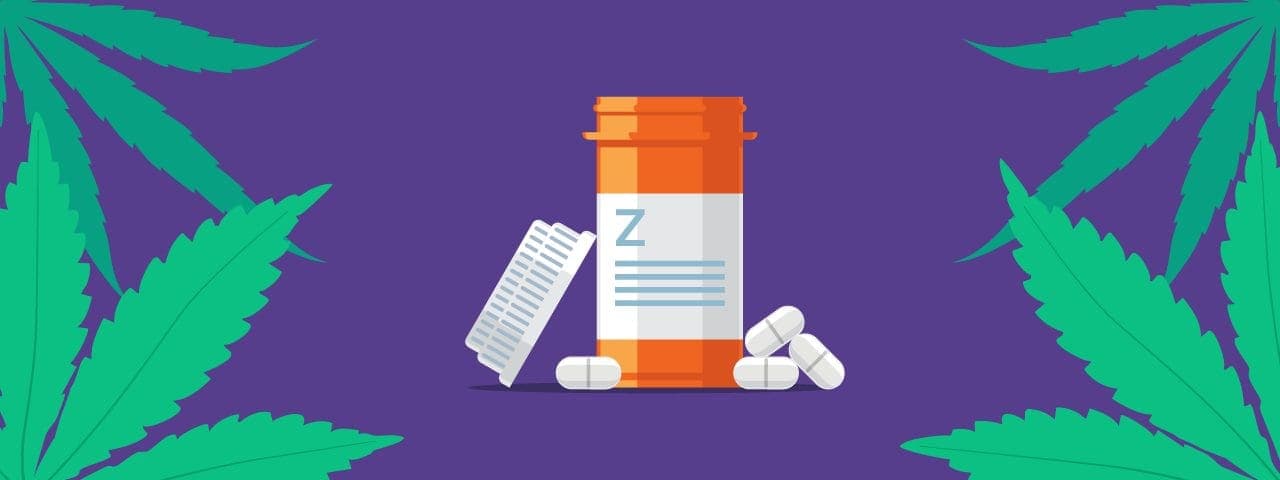What to know about using cannabis if you take SSRIs

Article written by

April AcernoContent Writer
Content reviewed by

Dr. Mark KasabuskiDirector of Provider Operations
Cannabis is commonly used for its mood-boosting effects. However, combining it with selective serotonin reuptake inhibitors (SSRIs) — a type of medication used to treat depression — carries certain risks.
Mixing the two can lead to increased side effects and, in rare cases, a potentially fatal condition known as serotonin syndrome.
If you’re taking an SSRI, it’s important to understand the risks of mixing it with cannabis.
What are SSRIs?
SSRIs are a type of prescription antidepressant that’s commonly used to treat health conditions such as:
- Major depressive disorder (MDD)
- Post-traumatic stress disorder (PTSD)
- Premenstrual dysphoric disorder (PDD), a severe form of premenstrual syndrome (PMS)
- Panic disorder
- Social anxiety disorder
- Obsessive-compulsive disorder (OCD)
Examples of SSRIs include:
How do SSRIs work?
SSRIs work by increasing levels of serotonin, a mood-boosting hormone, in your brain. Serotonin also helps regulate your:
- Sleep
- Energy levels
- Motivation
- Appetite
SSRIs can be an effective form of treatment for certain health conditions. But they can also cause side effects, such as:
- Diarrhea
- Dizziness and fainting
- Confusion
- Fatigue
- Headache
- Decreased sex drive
- Sweating
- Suicidal thoughts (especially at the beginning of treatment)
Your doctor can help you find a treatment plan that works for you while also minimizing the risk of side effects.
Is it safe to mix SSRIs and weed?
Combining cannabis with SSRIs can increase certain side effect risks, including:
- Dry mouth
- Drowsiness
- Dizziness
- Anxiety
- Nausea
- Insomnia
- Rapid or irregular heartbeat
- Problems with memory, judgment, and concentration
Cannabis can also inhibit the levels of liver enzymes that break down and metabolize SSRIs in your body. This may increase the concentration of the medication in your bloodstream. As a result, the effects of the medication may be stronger and longer-lasting.
In rare cases, combining cannabis with SSRIs can cause serotonin syndrome. This is a potentially fatal condition that occurs when serotonin levels are too high.
Symptoms of serotonin syndrome include:
- High fever
- Fast heartbeat
- High blood pressure
- Loss of muscle coordination
- General weakness
- Insomnia
- Panic attacks
- Agitation and confusion
According to some case reports, cannabis may raise serotonin levels. One case report in particular suggests that combining SSRIs with high doses of cannabis can increase the risk of serotonin syndrome. As such, it’s important to discuss this risk with your doctor.
Can I take CBD with SSRIs?
Cannabidiol (CBD) is a nonintoxicating compound found in cannabis. It’s often used to help with:
- Sleep
- Anxiety
- Pain
- Inflammation
Both CBD and SSRIs may cause drowsiness. Combining them may increase this side effect.
CBD is one of several cannabis compounds that may inhibit liver enzymes that help your body metabolize SSRIs. So combining the two substances can strengthen and prolong the effects of the medication.
Are there benefits to using cannabis with SSRIs?
Some research and patient reports suggest that combining cannabis with SSRIs offers enhanced symptom relief. But this combination should only be explored under medical guidance.
Some reported benefits of taking cannabis with SSRIs include:
- Lowering your medication dosage: Self-reported studies show that some people are able to lower their SSRI doses after using cannabis. However, this should only be done under your doctor’s guidance.
- Relieving side effects: Cannabis may help ease certain antidepressant side effects, including nausea and insomnia.
How to take weed and SSRIs
If you’re prescribed an SSRI, talk with your doctor before using it with cannabis. Together, you can establish a treatment plan that’s both safe and effective.
Also consider incorporating these safety tips into your treatment plan:
- Start low and go slow: Start out with low doses of both cannabis and your SSRI medication, as recommended by your doctor, to see how they affect you. Only increase the dosage amounts under your doctor’s guidance until you achieve the desired results. If you experience any side effects, lower each dose and ask your doctor about next steps.
- Be mindful of timing: Try taking your cannabis and SSRI doses at different times of day to minimize the risk of an interaction. Work on an exact schedule with your doctor based on the specific SSRI you take and your preferred cannabis products.
- Ask about other medications: If you’re taking other medications, talk with your doctor or pharmacist about additional risks for potential interactions or side effects before combining them with cannabis and SSRIs.
The takeaway: Speak with your doctor before combining cannabis and SSRIs
Both cannabis and SSRIs may increase serotonin levels in the body to help relieve symptoms of certain health conditions. However, combining them may put you at an increased risk of certain side effects, including serotonin syndrome in rare cases.
To find out more about the risks of mixing SSRIs and cannabis, talk with your doctor or a Leafwell pharmacist.
Resources
- Antidepressant and anxiolytic effects of medicinal cannabis use in an observational trial. https://pmc.ncbi.nlm.nih.gov/articles/PMC8458732/
- Cannabinoids and cytochrome P450 interactions. https://pubmed.ncbi.nlm.nih.gov/26651971/
- Exploring the use of cannabis as a substitute for prescription drugs in a convenience sample. https://harmreductionjournal.biomedcentral.com/articles/10.1186/s12954-021-00520-5
- Serotonin syndrome. https://www.ncbi.nlm.nih.gov/books/NBK482377/
- Serotonin syndrome and cannabis: A case report. https://pmc.ncbi.nlm.nih.gov/articles/PMC10809727/
- Serotonin syndrome versus cannabis toxicity in the emergency department. https://pmc.ncbi.nlm.nih.gov/articles/PMC7220016/
- SSRI antidepressant medications: Adverse effects and tolerability. https://pmc.ncbi.nlm.nih.gov/articles/PMC181155/
Frequently asked questions
Learn more about combining cannabis and SSRIs from answers to common questions.

